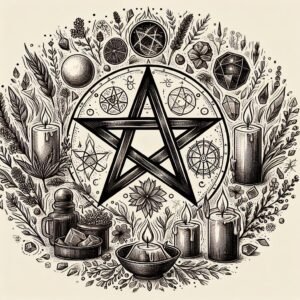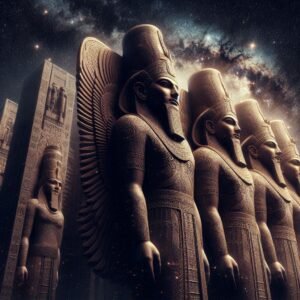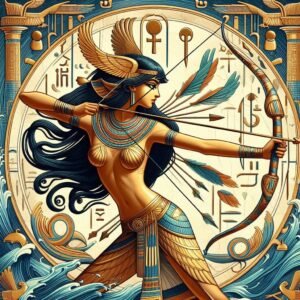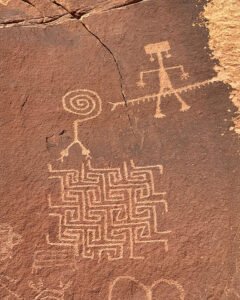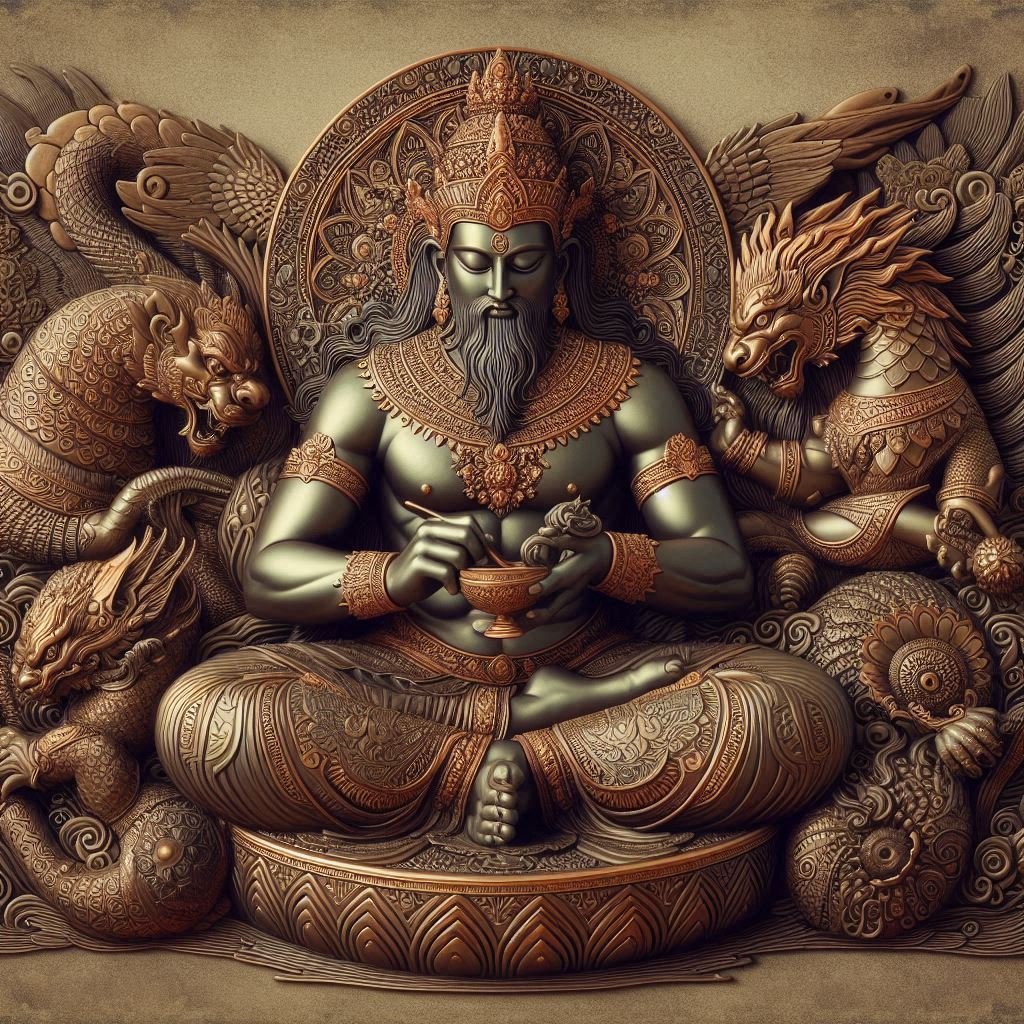
Enki, known as the Sumerian god of water, wisdom, and creation, holds a pivotal place in Mesopotamian mythology for his role in the creation of humanity. His narrative is richly detailed across several ancient texts, where he is often portrayed as a compassionate and innovative deity, deeply involved in the affairs of the world and its inhabitants. In the mythological framework, Enki is said to have crafted humans from clay, which is emblematic of the earth’s life-giving properties, and imbued them with the divine essence necessary for life.
The Atrahasis Epic, a significant source of ancient Mesopotamian lore, casts Enki in a crucial role where he responds to the plight of the gods burdened by labor. He proposes the creation of humans to relieve the gods from their toil, thus establishing humanity as a solution to divine fatigue. This narrative not only highlights Enki’s wisdom, but also his problem-solving acumen, positioning him as a mediator between the divine and the mortal realms.
Enki’s creative process involved moulding the first humans from a mixture of clay and the blood of a slain god, which provided these new beings with both the substance of the earth and the spark of divinity. This act of creation is deeply symbolic, representing the interconnection between the gods and humans, and the shared essence that binds all life. The blood of a god in the clay mixture signifies a transference of potential, knowledge, and life force, making humans not merely creations but also relatives of the divine.
Furthermore, Enki’s role in humanity’s creation is also linked with the endowment of special attributes such as intelligence, consciousness, and the capacity for emotion and procreation. By granting these qualities, Enki ensured that humans were not mere automatons but beings capable of thought, growth, and cultural development. This gift of cognitive abilities is a testament to Enki’s foresight and his desire for humans to thrive and evolve.
In addition to his contributions to the genesis of humans, Enki is also celebrated as a patron of craftsmen and artisans. His association with creativity and skill is reflected in the belief that he taught humans various arts and crafts, enabling the flourishing of civilizations. Enki’s influence is seen in the development of agriculture, writing, and the legal system, all of which are foundational elements of organized society.
Enki’s temple, the E-abzu, located in the city of Eridu, was a centre of worship and learning. It is within this sacred space that Enki was believed to have planned and executed his works, including the creation of humanity. The temple served as a reminder of Enki’s presence and his ongoing engagement with the world he helped shape. The E-abzu was not just a place of religious significance, but also a symbol of the knowledge and wisdom that Enki represented.
The narratives surrounding Enki’s role in creating humanity are multifaceted, encompassing themes of innovation, compassion, and the transfer of knowledge. These stories serve as allegories for the human condition, exploring the origins of human nature, the relationship between creators and their creations, and the responsibilities that come with the power of life. Enki’s actions reflect a profound understanding of the balance required to maintain harmony in the cosmos and the importance of nurturing the potential within all living beings.
Enki’s legacy, as preserved in these ancient myths, continues to be a subject of fascination and study. His character embodies the complexities of leadership and the dual responsibilities of sustaining life and fostering progress.
Enki’s relationship with Anu is a central theme in Mesopotamian mythology, reflecting the intricate dynamics of divine kinship and authority. Anu, the sky god, is often cited as the father of Enki, placing Enki within the lineage of the supreme deities of the ancient pantheon. This familial connection underscores the transfer of power and attributes from the celestial Anu to his offspring, who govern various aspects of the natural world and human affairs.
As the god of wisdom, water, and creation, Enki’s role is distinct from Anu’s overarching dominion of the heavens. Enki’s realm is the abzu, the watery depths beneath the earth, which is symbolic of both the source of life and the repository of divine knowledge. This separation of domains between father and son reflects the Mesopotamian understanding of the cosmos as a structured hierarchy, where each deity has a specific sphere of influence and responsibility.
The relationship between Anu and Enki also manifests in the myths and narratives that define the Mesopotamian religious landscape. In these stories, Enki is depicted as a mediator and innovator, often acting to bridge the gap between the divine will of Anu and the needs of humanity. Enki’s creative and protective actions, such as the creation of humans and the establishment of culture, demonstrate his role as a benefactor of mankind, a trait that may be seen as an extension of Anu’s desire for order and prosperity in the universe.
Enki’s mother is sometimes identified as Nammu, a primeval sea goddess, which adds another layer to his character as a god born of both the heavens and the primordial waters. This dual heritage endows Enki with a unique position among the gods, capable of traversing and uniting different realms of existence.
The relationship between Anu and Enki is further explored in the context of divine succession and conflict. In some myths, Anu’s authority is challenged by other deities, and Enki’s actions are crucial in resolving these conflicts. For instance, in the Atrahasis Epic, Enki plays a pivotal role in saving humanity from the deluge, a decision that may reflect his nuanced understanding of fate and divine justice, possibly inherited from his father, Anu.
Subscribe to our post updates - Don't miss a thing!!



